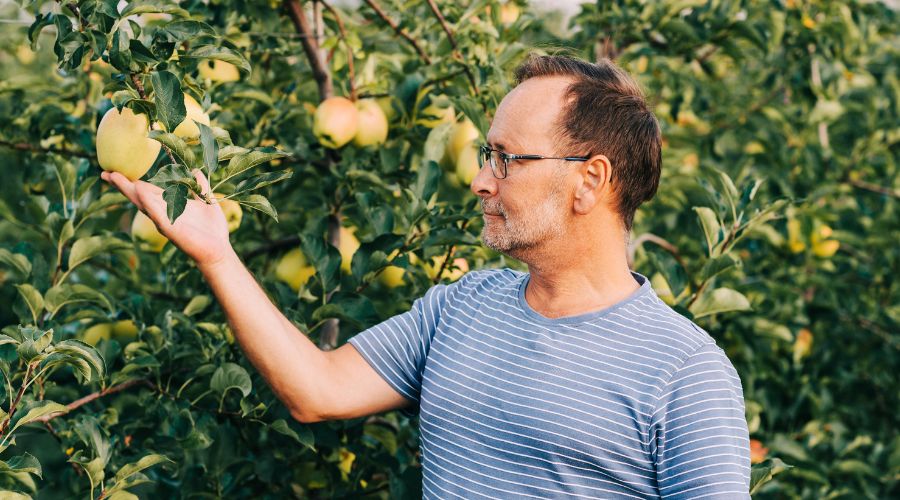University scientists back government’s support for fruit and vegetable growers
29th May 2024
Scientists at the University of Warwick are helping to boost the UK’s food security in the wake of a new government report on UK fruit and vegetable production.

The UK has a strong tradition in agriculture, including in growing fruits and vegetables.
The sector is essential for the UK’s economy, contributing £4.3 billion in 2022 and producing over 3 million tonnes of produce each year.
However, the UK only produces 17% of the fruit and 55% of the vegetables it consumes, so there is a big push to increase domestic production and improve food security, experts say.
Growing British
Researchers at the university’s internationally recognised Warwick Crop Centre are reflecting on a new government report, A blueprint to grow the UK fruit and vegetable sector, which details plans to support the fresh fruit and vegetable sector.
Research scientist Alex Kelly said: “We strongly welcome the government’s new commitment to boost the domestic production of fruit and vegetables.
“In our 2023 strategy paper titled Growing British, we outlined the economic, environmental, and nutritional benefits that could be realised in a vibrant, expanding fresh produce sector.
“By increasing our self-sufficiency in this vitally important sector, the UK is taking steps to safeguard our supply of fresh food and nutrition as more countries struggle with climate extremes.”
Green vegetable revolution

Professor Richard Napier, deputy head of the School of Life Sciences, added that the government’s new UK Food Security Index shows that home production ratios for vegetables and fruit hold the two bottom rankings.
“The blueprint recognises that the fresh produce sector has potential to grow, and the measures it announces to encourage growth are very good news.
“Part of the package of measures announced was a strong endorsement for growing skills and innovation.
“Just as in the first green revolution, which gave us the first high yielding varieties of cereal crops, much of the improvement in fruit and vegetable crop performance will come from better varieties, especially new lines with ‘inbuilt resilience’ to the stresses of pests, diseases and climate change.
“This is something we are particularly addressing at the University of Warwick,” Professor Napier explained.
He said that, for example, the extra investment in the UK’s genetic improvement networks could help with sequencing collections and would underpin essential crop improvements for the most nutritious crops.
Professor Napier added that investment now in genome sequencing will make natural genetic diversity accessible to breeding companies and accelerate the much-needed green vegetable revolution.
Tailored SFI payment scheme

Professor Rosemary Collier, University of Warwick, added that a priority, which was not specifically mentioned in the blueprint, is support for the transition from the use of conventional pesticides to integrated pest management (IPM).
“A tailored Sustainable Farming Incentive (SFI) payment scheme, specifically designed for the fresh produce sector, could help growers adapt, by de-risking the reduction of conventional pesticides.
“The regulatory system for biopesticides must also be streamlined and altered to encourage an increase in biological control products, which growers need as part of their conversion away from chemicals.
“For vegetables and fruit, cost effective IPM strategies for each crop still need to be researched, produced and detailed.
“The UK is leading the world in this branch of applied science, and further adoption of data science and AI will assist in the development of IPM strategies for growers of fresh produce,” she added.
Championing UK food security
The experts said that the University of Warwick is playing a “vital role” in championing UK food security.
It led to the publication of Growing British, a green paper that backs a 30% increase in UK consumption of fresh fruit and vegetables by 2032.
Growing British also reports on up to £126 billion of long-term economic benefits from a healthier, more sustainable UK food system of which increasing fruit, vegetable and fibre consumption is a core component.
This also has the potential to create more than 16,000 jobs in the UK agriculture industry.
Alongside Growing British, the university’s internationally recognised crop centre celebrates 75 years of operation in July, with events set to reflect on its history and a look to the future of agriculture.
Warwick Crop Centre was founded as the National Vegetable Research Station (NVRS) to address post-war pressure to increase food production.
Since then, it has undergone various transitions, most recently being incorporated into the University of Warwick’s School of Life Sciences.
It continues to produce research, contributing to sustainable agricultural practices for the future.
The Crop Centre’s aims are to equip the industry with innovative solutions to help tackle the multitude of challenges that lie ahead for sustainable home-grown food production.
Sign up to a webinar hosted by Professor Rosemary Collier on the future of vegetable breeding on Thursday 30th May, here.
Read more fruit news.
